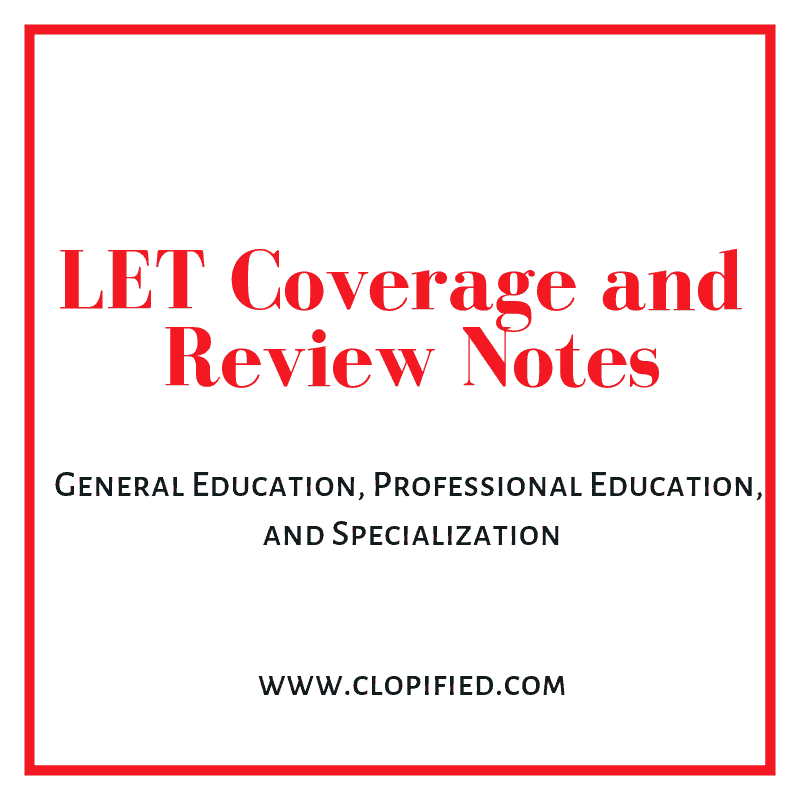Where should I start?
If this is what you’ve been asking yourself after PRC registration, worry not! I asked the same question when I was in your position – reviewing for LET and aspiring to be a professional teacher. The licensure examination for teachers could be tricky since there were numerous of tips heard from previous experiences.
Some teachers advise you to focus on general education while others put huge emphasis on professional education. Some even claim that reviewing thoroughly must not be prioritized. Instead, you should focus on practice teaching as it would have a maximum effect on your exam. Do they sound familiar?
No matter what kind of advice you receive, the best option is to be prepared. I’d rather work hard and find out that I have done more than what’s needed. I would never want to regret in the end for not giving my best.
Let’s go back to the question: “Where should I start?”
The FIRST STEP, just like in every kind of assessment and situation, is to IDENTIFY. In this case, it is to identify the LET Coverage: General Education, Professional Education, and Specialization.
The SECOND STEP, after identifying what’s needed, is to REVIEW. Each heading has an embedded link to redirect you to the page you need. Choose the correct title to be redirected to the notes. It’s a compiled notes you can read anywhere. Make sure to BOOKMARK the page to access it immediately.
The THIRD STEP is to DEVELOP THE RIGHT HABITS. You have to decide on your habits of reviewing whether it’s self review, enrollment in a review center, or both. Regardless of your chosen step, it always depends on your own determination and effort.
Read this article “Tips to Pass LET: Self-review Guide”. Click here.
LET COVERAGE: GENERAL EDUCATION
ENGLISH
- Philippine Literature
- Speech and Oral Communication
- Study and Thinking Skills
- World Literature
- Writing in the Discipline
FILIPINO
- Komunikasyon sa Akademikong Pilipino
- Masining na Pagpapahayag
- Pagbasa at Pagsulat tungo sa Pananaliksik
MATHEMATICS
- Business Math
- Elementary Algebra
- Fundamentals of Math
- Plane Geometry
- Statistics and Probability
SCIENCE
- Biological Science – General Biology
- Physical Science- with Earth Science
SOCIAL SCIENCES
- Agrarian Reform
- Arts
- Basic Economics
- Culture with Family Planning
- Information and Communication Technology
- General Psychology
- Philippine Government New Constitution with Human Rights
- Philippine History
- Philosophy of Man
- Rizal and Other Heroes
- Society
- Taxation
LET COVERAGE: PROFESSIONAL EDUCATION
- Assessment of Student Learning, Developmental Reading
- Field Study, Practice Teaching
- Facilitating Learning, Child and Adolescent Development
- Principles of Teaching, Educational Technology, Curriculum Development
- Teaching Profession, Social Dimensions of Education
LET COVERAGE: SPECIALIZATION
BIOLOGICAL SCIENCES
- Anatomy and Physiology
- Biochemistry
- Biological Science I
- Biological Science II
- Cell Biology
- Ecology
- Genetic and Evolution
- Inorganic Chemistry
- Microbiology
- Organic Chemistry
ENGLISH
- English for Specific Purposes
- Methodology: The Teaching of Speaking, Listening and Reading; Teaching of Literature; Preparation and Evaluation of Instructional Materials; Language and Literature Assessment; Language Research; Campus Journalism; Translation and Editing of Text; Speech and Stage Arts; Creative Writing
- Literature: Mythology and Folklore; Afro-Asian Literature; English and American Literature;
- Remedial Instruction in English
- Theoretical Foundations of Language and Literature: Introduction to Linguistics; Structure of English; Introduction of Stylistics; Literary Criticism
FILIPINO
- Mga Batayang Teoretikal: Introduksyon sa Pag-aaral ng Wika; Panimulang Linggwistika
- Wika at Panitikan
- Metodolohiya, Pagtataya at Ebalwasyon, at Kagamitang Pangturo
MAPEH
- Foundations of MAPEH: Methods and Strategies of Teaching MAPEH
- Coaching and Officiating of Sports Events, Dance Competitions and Music Activities
- Organization and Management, Research, Special Education in MAPEH
- Physical Education: Anatomical, Mechanical and Physiological Bases of Movement
- Gymnastics: Philippine Folkdance; Team SPORTS, Aquatics; International Folk Dance and Other Dance Forms; Athletics, Individual, Dual and Combative Sports
- Health Education: Personal Community, Environmental Health, Safety Education and First Aid. Health Practicum. MUSIC: Philippine and Asian Music; Solfeggio and Applied Piano, Integrated Music Theory, Music Literature, Choral Works and Conducting and Randalia Playing Instrumentation
- Art Education
MATHEMATICS
- Arithmetic & Number Theory
- Analytical Geometry
- Basic & Advanced Algebra
- Business Math
- Calculus
- History of Mathematics
- Instrumentation and Assessment
- Mathematical Investigation
- Modern Geometry
- Linear and Abstract Algebra
- Plane and Solid Geometry
- Probability and Statistics
- Problem Solving
- Trigonometry
PHYSICAL SCIENCES
- Nature of Science
- Chemistry: Atomic and Molecular, Chemical Bonds, Conservation of Matter , Gases, Liquids and Solids, Acids and Bases, Solutions, Chemical Thermodynamics, Chemical Kinetics and Equilibrium, Organic and Biochemistry , Nuclear Processes
- Physics: Physical Quantities and Vectors, Mechanics, Electricity, Magnetism , and Electronics, Thermodynamics, Modern Physics, Light and Geometries Optics, Earth and Space, Astronomy , and Environment
SOCIAL STUDIES AND SCIENCES
- Economics: Micro-Macro Economics-Economic Planning and Strategies
- Geography
- Politics and Governance
- Philippine and World History
- Research
- Sociology and Anthropology
- Teaching Methods: Teaching Approaches in Secondary Social Studies; Productions of Instructional Materials for Social Studies; Building Bridges Across Social science Discipline
- Teaching Assessment: Assessment and Evaluation in the Social Sciences/Social Studies
- Trends and Issues in Social Studies
Do not forget to click the head section, or the title to be redirected to the review notes. These notes are compiled and posted on our Facebook page everyday. Like our Facebook page (click here), and join our Clopified Community of Learners Group (click here). Since we are compiling them, it will be updated from time to time.
Meanwhile, you may do an online practice of Professional Education questions for free.
I. LET Reviewer Professional Education – 25 questions – Click here.
II. LET Reviewer Professional Education – 50 questions – Click here.
III. LET Reviewer Professional Education – 75 questions – Click here.
IV. LET Reviewer Professional Education – 100 questions – Click here.
V. LET Reviewer Professional Education – 150 questions – Click here.
What did you learn today? Post your learning.
What do you want to know? Ask questions.
What do you like to contribute? Upload files here.
or
Comment below.










